Magazine-artikelen, januari tot juli 2020
Emoties in de Amerikaanse voorverkiezingen
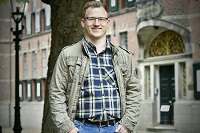
Het was zijn eigen American Dream. Met twee beurzen op zak ging Martijn Blikmans onderzoek doen naar het effect van emotionele communicatie tijdens de voorverkiezingen in Amerika. In het land zelf. Het lab uit, de praktijk in. Uiteindelijk bleef het door corona bij één verkiezingsdebat. En een database van 'slechts' 250.000 tweets.
Lees meer
Blijf de mens achter de roker zien
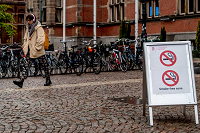
Susanne Täuber deed eerder onderzoek naar het effect van goedbedoelde overheidscampagnes tegen roken en voor een gezonde levensstijl. Volgens haar leveren de goede bedoelingen van de overheid vooral verdeeldheid op.
Lees meer
Bescherming van mensenrechten en de rechtsorde in tijden van crisis
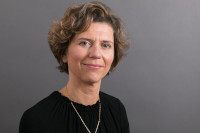
Het voelt tegenstrijdig dat iets wat gebeurde aan de andere kant van de aardbol, ons nu dwingt om lokaal in actie te komen. Maar terwijl we aan huis, tuin en balkon gebonden zijn, mogen we de mondiale omvang van deze crisis niet uit het oog verliezen, aldus Brigit Toebes. Volgens haar hebben de lockdownmaatregelen in verband met COVID-19 geleid tot een crisis op het gebied van internationaal recht en mensenrechten.
Lees meer
Omgevingspsychologie doet mee in strijd tegen klimaatverandering
Klimaatverandering is een van de grootste bedreigingen voor de mensheid. Er is dringend actie nodig om de opwarming van de aarde te stoppen. Deze interactie tussen mens en milieu wordt onderzocht door omgevingspsychologen; zij onderzoeken de psychologische aspecten van klimaatverandering en -beleid.
Lees meer
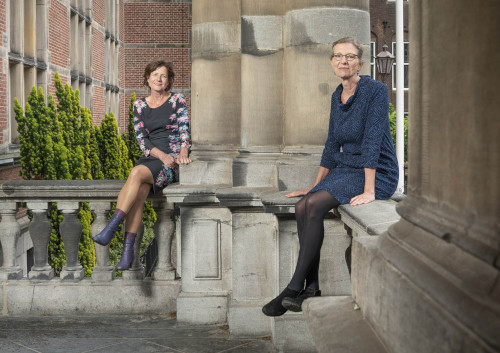
Met detectivewerk naar een Spinozapremie
In haar jongere jaren was Pauline Kleingeld nieuwsgierig naar de achtergronden van de vele geloofsgemeenschappen in haar dorp. Inmiddels is ze een van ’s werelds meest vooraanstaande onderzoekers van de filosofie van Kant. Precies op het moment dat ze een belangrijke fase in haar onderzoek afrondt wordt ze geëerd met de Spinozapremie. Die maakt haar gedroomde vergezichten reëel.
Lees meer
Het antwoord op de filterbubbel? Artificial Intelligence!
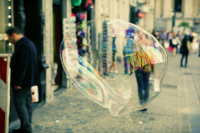
De berichtgeving rondom het coronavirus heeft nog maar weer eens duidelijk gemaakt dat we steeds meer in onze eigen filterbubbel zijn gaan leven. Omdat algoritmes op sociale media onze newsfeed bepalen en ‘klassieke media’ ook op personalisering inzetten, krijgt iedereen alleen maar informatie te zien die zijn of haar wereldbeeld bevestigt. Hoogleraar Computationele Semantiek Tommaso Caselli en het team Data Science van het Centrum voor Informatie Technologie (CIT) willen onze filterbubbel doorbreken – met behulp van… een algoritme.
Lees meer
Fans in een onzekere wereld
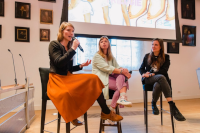
Een Harry Potter-halsketting, een Harry Potter-quilt, of een zelfgeschreven Star Trek-verhaalvariant, alles gemaakt door fans. Onderzoekster Welmoed Wagenaar kijkt er niet vreemd van op. Als tiener bracht ze uren door op forumwebsites en ontdekte ze ‘fanfictie’: fictie geschreven door fans, waarbij personages en andere elementen van bestaande verhaalwerelden worden geleend om een eigen verhaal te maken. Haar fascinatie bouwde ze uit tot een NWO-gesubsidieerd onderzoek over online media fandom.
Lees meer
Zo worden kinderen verliefd op sport
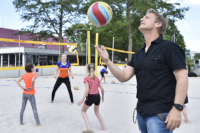
Hij is docent, onderzoeker, lector. Allemaal waar. Maar meer dan dat is Remo Mombarg liefdesmakelaar. Met hart en ziel koppelt hij scholieren aan zijn eigen grote liefde: sport. Met bijzondere aandacht voor het struikelende kind bij wie bewegen niet vanzelf gaat. ‘Onze maatschappij heeft de neiging sport te presenteren als verplichte dagelijkse portie levertraan. Maar wie verliefd wil worden op sport, moet zelf kunnen ontdekken waar hij plezier in heeft.’
Lees meer
Hoe Spotify de muziekindustrie beïnvloedt (en daarmee ook ons luistergedrag)
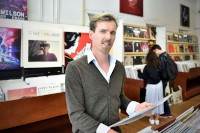
Persoonlijke playlists samenstellen, als muzikant niet meer afhankelijk zijn van radiozenders of platenlabels, gratis muziek luisteren: muziekplatform Spotify lijkt de macht volledig bij artiesten en luisteraars te leggen. Maar net als de “oude” radio beïnvloedt ook deze “Nieuwe radio” hoe we muziek ontdekken en luisteren, zegt onderzoeker Robert Prey. En de artiesten? ‘Die zitten in de beste én slechtste positie ooit.’
Lees meer
Wat doen jongeren op 'normale' plekken?
Janine Venema onderzoekt hun dagelijks leven en identiteit
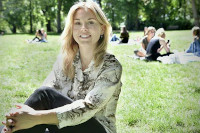
Kersverse promovenda Janine Venema raakt maar niet uitgestudeerd. Na het vmbo, hbo en een universitaire studie miste ze al snel de collegebanken. Sinds januari doet ze bij het Population Research Centre onderzoek naar het dagelijks leven van jongeren. Zo hoopt ze ook iets te kunnen betekenen voor hun welzijn.
Lees meer
Gierst: oude gewassen voor de toekomst
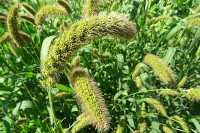
Honger, uitdroging, verschraling. Je hoeft geen onheilsprofeet te zijn om dit als toekomstbeeld voor een deel van de wereld te schetsen. De verschillende soorten gierst bieden misschien een oplossing. Niet voor niets heeft de VN 2023 uitgeroepen tot International Year of Millets. René Cappers en Peter Berger onderzoeken in India wat ervoor nodig is om de verbouw te bevorderen.
Lees meer
Archeologie zonder spade
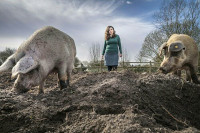
De steentijdmens die niet meer op wilde dieren jaagt, maar ze ‘bij huis gaat houden’. Archeozoöloog Canan Çakırlar onderzoekt hoe de veeteelt is begonnen. Het is een van de vele thema’s waar men op het Groninger Instituut voor Archeologie de afgelopen honderd jaar is ingedoken.
Lees meer
Leiders in tijden van corona
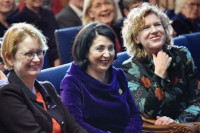
De wereld is in crisis. Er wordt veel gevraagd van ons allemaal. Zeker ook van onze leiders. Janka Stoker is hoogleraar Leiderschap en Organisatieverandering en mededirecteur van het expertisecentrum In the LEAD, van de Faculteit Economie en Bedrijfskunde. Dat doet onderzoek naar de effectiviteit van leiderschap en verstrekt advies op maat aan organisaties en professionals. Een gesprek over leiderschap, in tijden van corona.
Lees meer
Verward en bang door geluiden
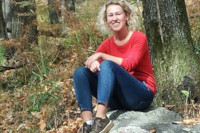
Doof of blind? Wat ben je liever? Iedereen heeft hier als kind weleens over nagedacht. En je voelde ook toen al aan dat deze vraag draaide om het gevoel van veiligheid. Een gevoel dat mensen met dementie eerder missen, omdat ze geen grip hebben op de wereld om hen heen. Onverwachte geluiden kunnen dan bedreigend overkomen en probleemgedrag of depressie veroorzaken. Maar met een paar eenvoudige ingrepen is dat al snel te voorkomen, vertelt promovenda Janouk Kosters.
Lees meer
Pleidooi voor een toekomstbestendig gezondheidssysteem
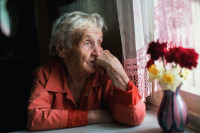
Berlijn is een van de meest ideale steden voor een architectuur- en stedenbouwexcursie. Prof. dr. Cor Wagenaar, hoogleraar geschiedenis en theorie van architectuur en stedenbouw, gaat er ieder jaar met zijn derdejaars bachelorstudenten naar toe. Dit jaar waren ze net niet op tijd. Terwijl ze er aan het werk waren ging de stad steeds meer op slot. “Sommige studenten begonnen zich toch een beetje ongerust te maken, waarop we besloten ze de keuze te geven iets eerder terug naar Groningen, of naar familie te gaan. Toen iedereen weer veilig thuis was ben ik er nog een paar weken gebleven. Het was interessant om te zien hoe de stad in etappes op slot ging.”
Lees meer
Wat werkt in de strijd tegen landroof?
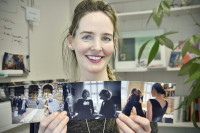
Over de hele wereld kopen bedrijven en investeringsfondsen land op om te gebruiken voor landbouw of mijnbouw, met grote impact op het milieu en lokale bewoners. Bedrijven, hulporganisaties, de provinciale en landelijke overheid – sommigen werken landroof in de hand, maar ze werken ook samen aan oplossingen. Juist die dynamiek vindt onderzoeker Nienke Busscher zo interessant. Meerdere malen is ze in Argentinië geweest, om uit eerste hand te horen wat wel en niet werkt.
Lees meer
De psychologische impact van de coronacrisis
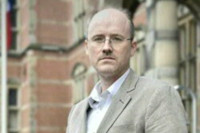
Wat zijn de gevolgen van de coronacrisis op ons welbevinden? Wat denken mensen over deze pandemie? Wat zijn hun verwachtingen over de economische gevolgen ervan, over de toekomst? Psycholoog Pontus Leander leidt een wereldwijd psychologisch onderzoek, PsyCorona, naar de gevolgen van de coronacrisis.
Lees meer
Tradities in het Arctisch gebied in tijden van verandering
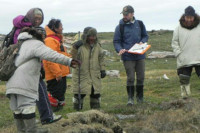
In 2018 ontving Sean Desjardins, postdoc van het Arctisch Centrum, een NWO Veni-beurs om onderzoek te doen naar de veerkracht van het traditionele Inuit-leven in Arctisch Canada. Hij vertelt over zijn interdisciplinaire aanpak en over zijn samenwerking met inheemse gemeenschappen. Desjardins streeft ernaar om gedegen onderzoek te doen, maar hij wordt duidelijk ook gemotiveerd door de relevantie van zijn onderzoek voor dit gebied en voor inheemse samenlevingen in de rest van de wereld.
Lees meer
Jan Staal kent de RUG als geen ander
Na tientallen jaren bij de universiteit met pensioen
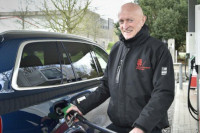
Hij begon in de postkamer van de RUG, reed jarenlang met een laboratorium door binnen- en buitenland en is nu, nog even, chauffeur van de universiteit: na een carrière van bijna 50 jaar bij de RUG gaat Jan Staal dit voorjaar met pensioen. Hoe blikt hij terug op al die jaren, waarin hij van alles bij de universiteit deed en waarin veel veranderde?
Lees meer
‘Ouderen zouden bij aanschaf e-bike verplicht op cursus moeten’
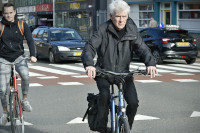
De e-bike, fietsende schoolkinderen en ouderen in het verkeer. Hoogleraar verkeerspsychologie Karel Brookhuis (bijna 70) heeft er een uitgesproken mening over. Nu nadert het einde van een lange carrière. Aarzelend stapt hij van zijn zeepkist.
‘Als psycholoog weet ik als geen ander van veroudering. Je vermogens gaan achteruit. Dat merk je zelf niet, want het gaat heel geleidelijk.’
Lees meer
Corona breekt wet?
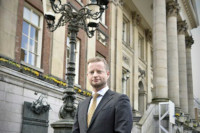
Hij heeft het druk. Het coronavirus woedt en bestuurlijk Nederland heeft hem nodig. Noodrechtdeskundige Adriaan Wierenga heeft lokale overheden aan de lijn die bijvoorbeeld willen weten wat de quarantainemogelijkheden zijn om het virus te kunnen beteugelen.
Lees meer
Studenten leggen Artificial Intelligence uit in het nieuwe Forum Groningen
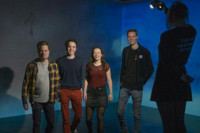
Studenten Artificial Intelligence Martijn, Eline, Pim en Bram geven rondleidingen, cursussen en demonstraties bij de expositie AI: More than human in het nieuwe Forum Groningen. Een leerzame ervaring, met knuffelbare robots, dansende kinderen en argwanende volwassenen.
Lees meer
Beter begrip van het menselijke brein
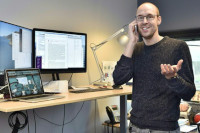
‘Gedachten lezen’, dat is waarmee Jelmer Borst zich bezighoudt. Maar dan niet op een esoterische manier, maar met hightech neuro-imaging technieken. Zo krijgt hij inzicht in wat er in ons brein gebeurt als we bijvoorbeeld multitasken, problemen oplossen of onze gedachten laten afdwalen.
Lees meer
‘We zitten vast in het stoornisdenken’
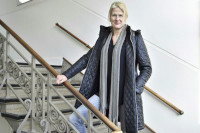
Ze schreef het boek Hoe voorkom je ADHD? Door de diagnose niet te stellen. Ze nam het initiatief voor Festival Apaart, voor meer tolerantie voor mensen die ‘anders’ zijn. En ze bedacht een plan voor klassikale kinderfeestjes. Allemaal activiteiten die psychologe Laura Batstra typeren.
Lees meer
Minibiebs succesvoller dan ze lijken
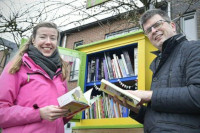
‘Minibiebs? Die gebruikt toch niemand?,’ riep een collega vooraf, als reactie op dit artikel. En inderdaad, de kastjes in voortuinen met weggeefboeken erin lijken er soms wat eenzaam bij te staan, verloren in het niemandsland tussen goede bedoelingen en nutteloosheid. Maar dat beeld blijkt niet correct.
Lees meer
Hoe kan onze samenleving zijn privacy behouden?
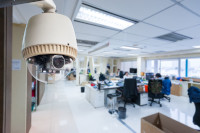
Onlangs waarschuwde oud-marinier Ingo Piepers in de Volkskrant nog voor het gevaar dat “Als men niet oppast, de nieuwe orde geen democratische maar bijvoorbeeld een Chinese wordt”. Daar worden mensen in het openbaar op grote schaal in de gaten gehouden door camera’s. Naar de invloed van massa-surveillance op de privacy van een samenleving doet filosoof Titus Stahl onderzoek. Het tast volgens hem niet alleen de privacy van individuen aan maar ook van een samenleving als geheel.
Lees meer
Missie: vrouwen hun eigen keuzes laten maken
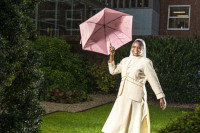
Elizabeth Revai Mudzimu groeide op in het zuiden van Zimbabwe waar ze als achtjarig meisje besloot dat ze later non wilde worden. Ze wérd non en gebruikt nu haar promotieonderzoek aan de RUG om andere vrouwen te helpen hun eigen keuzes te maken. Net als zij zelf heeft gedaan.
Lees meer
Dynamiek in de journalistiek
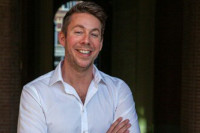
De gevaren van fake news kent hij natuurlijk, maar de invloed ervan lijkt in Nederland nog binnen de perken te blijven. En het zou volgens Frank Harbers link zijn als een overheid nieuwsvoorziening gaat reguleren. ‘Als een regering gaat bepalen wat wel of geen nepnieuws is, dan ligt censuur op de loer.’
Lees meer
Microplastics? Ventileren, ventileren en stofzuigen
‘Tot in de diepste putjes van de Himalaya worden microplastics gevonden’
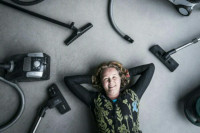
Langzaam dringt het tot ons door dat onze wereld vergeven is van de microplastics. En dat dat weinig goeds betekent. Prof. dr. Barbro Melgert wil weten wat zij aanrichten in onze longen. Ze heeft goede hoop volgend jaar opnieuw subsidie te krijgen van ZonMW om haar onderzoek aan het UMCG voort te kunnen zetten.
Lees meer
Tijd voor een nieuwe kijk op gehoorproblemen
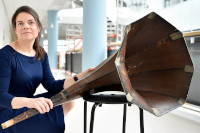
Met een flinke dosis nieuwsgierigheid navigeert Sonja Pyott door de complexe wereld van het brein en onze oren. Bestemming: gehoorproblemen voorkomen of verbeteren. En als ze er onderweg voor kan zorgen dat we met een andere blik naar ons gehoor kijken, dan is de ontdekkingstocht compleet.
Lees meer
Maak van zorgrobot vooral geen mens
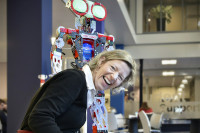
Robots spelen in de toekomst een belangrijke rol in onze dienstverlening. In de zorg zijn extra handen meer dan welkom. Maar geef die robots vooral geen naam of een menselijk gezicht, waarschuwt hoogleraar Jenny van Doorn. We voelen ons slecht op ons gemak bij surrogaatmensen, met alle gevolgen van dien.
Lees meer
